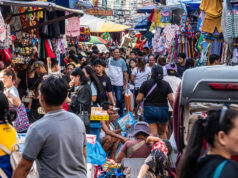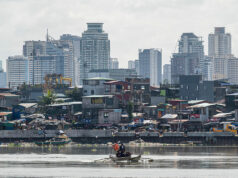P900-billion of goods smuggled in 2011-15 – study
SMUGGLED GOODS worth as much as P900 billion entered the Philippines in a span of five years, a study by the University of Asia and the Pacific (UA&P) revealed.

The Multi-Industry Trade Barometer Research Study conducted by the UA&P revealed that from 2011 to 2015, a total of P904.6 billion worth of goods were smuggled in across eight sectors – petroleum, steel bars, cigarettes, resins, wood, sugar, palm oil, and automative batteries.
The illicit trade during the period translated to P495.5 billion lost in the country’s total gross domestic product (GDP.)
“Illicit trade reduces government revenues needed for inclusive growth and poverty reduction, damages legitimate businesses and entrepreneurship and causes loss of legitimate employment,” said Rolando T. Dy, the Head of the Project Study.
According to the study, P680 billion worth of petroleum – which includes diesel oil, motor gasoline, jet fuel, kerosene, fuel oil, and liquefied petroleum gas – was smuggled in 2011 to 2015.
“The estimated revenue losses to the government caused by the non-payment of the 12% VAT (value-added tax) reached P81.6 billion from estimated smuggled value of P680 billion from 2011 to 2015,” the study read.
Smuggled petroleum during the period accounted for a 0.48% reduction in total economic growth or P276 billion.
Meanwhile, steel bars – most of which came from China – was the next most smuggled category of goods, with P106.1 billon worth having been snuck in during the five-year period, translating to a 0.11% or P65.8 billion of total GDP lost during the period. Revenue losses amounted to P12.7 billion.
Next, P42.9 billion worth of resins were smuggled in from 2011 to 2015,, which translated to a loss of P46 billion in economic growth.
“The main sources of illicit trade are mostly Asian countries like Japan, Singapore, South Korea, Thailand, Malaysia, China, and Taiwan,” the report read.
A total of P30.9 billion of palm oil, mostly from Malaysia and Indonesia, was smuggled in during that period, resulting in estimated VAT losses to the government of P3.7 billion. This translated to a 0.08% or P45.8 billion cut in GDP during those five years.
This was followed by P24.8 billion worth of smuggled wood products – including plywood, veneer panel and similar laminated wood – which translated to a GDP cut of around P34.4 billion, and P3 billon in VAT revenues loss.
Smuggled refined white sugar, meanwhile, came to P9.3 billion during that period, which trimmed GDP by about P15.4 billion.
Automotive batteries worth P753.8 million were smuggled in during the five-year period, with total VAT losses estimated at P90.5 million or P18.1 million annually. This slashed the GDP by around P1.2 billion.
Lastly, P9.8 billion worth of cigarettes were smuggled in from 2013 to 2015 which cut GDP by P10 billion during the three-year period.
“There is a huge opportunity to plug leakages from illicit trade which can complement the tax reform efforts of the Duterte administration in its “Build, Build, Build’ agenda,” Federation of Philippine Industries, Inc. Chairman Jesus Arranza said. – Janine Marie D. Soliman



